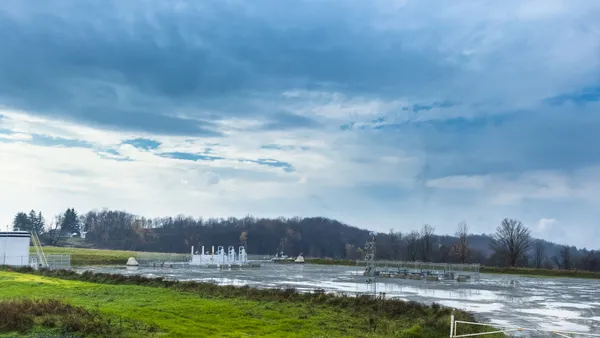Dive Brief:
-
Through legislation signed last week, New Jersey governor Phil Murphy directs the state's Economic Development Authority to establish a Garden State Commercial Property Assessed Clean Energy (C-PACE) program to allow property owners to access financing energy projects via municipal assessments.
-
The C-PACE program would help fund renewable energy generation, microgrids, energy efficiency upgrades, resilience improvements and other clean energy projects for industrial, commercial and agricultural properties. The program would also apply to large residential developments and properties owned by nonprofits.
-
The new program will provide a reliable mechanism for funding up-front costs associated with clean energy improvements, and may come with a host of additional benefits such as decreased interest rates and longer repayment terms, according to Matthew Karmel, an associate specializing in environmental projects for New Jersey law firm Riker Danzig Scherer Hyland & Perretti.
Dive Insight:
The new law should open doors for those in the state's commercial real estate industry who seek to embrace renewable energy, Karmel said.
As an attorney in the area, he noted in an email that New Jersey has a thriving industrial/warehouse real estate market that could stand to benefit from greater access to financing for clean energy projects. While there are tax credits available for commercial ventures, he said, a C-PACE program would enable property owners to cover costs upfront and offer lenders more security because the repayment of financing is tied to the property tax bill.
"As New Jersey works diligently to address climate change at all levels, this is an important tool to allow private sector capital to efficiently finance the renewable energy transition," Karmel said, adding that "If the Garden State can't encourage renewable energy investment through the private sector, it will have to spend public dollars to reach its ambitious goals."
According to the nonprofit PACENation, property assessed clean energy programs can cover 100% of a project's costs, may come with financing terms up to 20 years in length, and can still be combined with other utility and governmental incentive programs. The PACE assessments are filed with local municipalities as a lien against the property, so the financing follows the property should it change ownership.
Because these projects typically cost less than the energy savings they bring, PACE financing is typically cash flow positive at the outset, according to PACENation. Legislation allowing PACE financing exists in 37 states, and 26 states currently have active PACE programs.
"Countless commercial property owners across the state are ready to embrace renewable energy, but upfront costs are an obstacle," State Sen. Kip Batement, R, said in a statement. "The legislation signed today will help mitigate the fiscal concerns and provide owners with flexible, long-term financing alternatives."
Bateman said that in 2011, New Jersey adopted one of the nation’s most aggressive renewable energy portfolio standards and, as the bill sponsor, he added that the new law "will make clean energy more accessible and affordable" for residents.
While the scope of New Jersey's legislation is quite broad, including mechanisms to finance not only energy generation but also retrofits to improve energy efficiency, flood and hurricane resistance, Karmel said he did wish the bill had addressed waste management and opened a door for carbon capture as well. Nonetheless, he said, the signing of the bill was simply the first step — details remain to be ironed out.
"We're looking forward to seeing how it is implemented, how municipalities engage with the program, and how the relevant industries use the program to save money and improve our environment," he said. "There's a lot more work to do."














